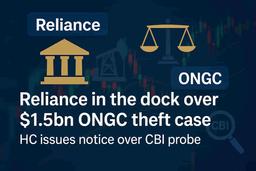Market Flat! Profit Booking Cancels Global Gains Amid Election Jitters
Economy
|
Updated on 13 Nov 2025, 11:11 am
Reviewed By
Akshat Lakshkar | Whalesbook News Team
Short Description:
Stocks Mentioned:
Detailed Coverage:
Benchmark stock market indices, the S&P BSE Sensex and NSE Nifty50, closed largely flat on Thursday, marking a pause after three consecutive days of gains. Investors engaged in profit booking, which neutralized early advances driven by optimistic global and domestic triggers. Positive international news, such as the US signing a short-term funding bill to avoid a government shutdown, and domestic hopes for tariff relief for India, initially buoyed sentiment. Furthermore, record-low inflation prints reinforced expectations of a Reserve Bank of India (RBI) rate cut, making rate-sensitive sectors attractive.
However, sustained outflows from Foreign Institutional Investors (FIIs), a weak Indian Rupee, and pre-election caution ahead of the Bihar election results led to profit-taking at elevated levels. This resulted in the benchmark indices remaining largely unchanged by the closing bell.
Among top performers, Asian Paints rallied 3.81%, followed by ICICI Bank (1.99%), Power Grid (1.16%), Larsen & Toubro (1.16%), and Bajaj Finserv (0.90%). Conversely, Eternal saw the steepest fall (-3.63%), with Tech Mahindra Ventures (-2.26%), Maruti Suzuki India (-1.45%), Trent (-1.19%), and Tata Steel (-1.15%) also declining.
Analysts, like Ajit Mishra of Religare Broking Ltd, suggest that some consolidation is likely as the Nifty approaches its previous swing high resistance zone around 26,000–26,100. Despite this, the overall market sentiment remains constructive, supported by the resilience in key sectors such as banking and IT. Traders are advised to adopt a stock-specific strategy, focusing on sectoral outperformers while maintaining disciplined risk management amid potential volatility.
Impact This news has a moderate impact on the Indian stock market as it indicates a pause in the rally and potential for consolidation, influenced by both domestic and global factors. While not a major downturn, it signals caution for investors. Rating: 6/10
Difficult Terms Explained * Benchmark stock market indices: Major stock market indexes like Sensex and Nifty that represent the overall market's performance. * Profit booking: Selling stocks after a price rise to secure gains. * Global and domestic positive triggers: Favorable news or events from international markets and India. * Dalal Street: A colloquial term for the Indian stock market, referring to Dalal Street in Mumbai where the BSE is located. * S&P BSE Sensex: A benchmark index of 30 large, well-established companies listed on the Bombay Stock Exchange (BSE). * NSE Nifty50: A benchmark index of 50 large, well-established companies listed on the National Stock Exchange (NSE). * FII (Foreign Institutional Investors): Overseas entities that invest in Indian securities. * RBI (Reserve Bank of India): India's central bank, which manages monetary policy. * Rate cut: A reduction in interest rates by the central bank, aimed at stimulating economic growth. * Rate-sensitive sectors: Industries whose performance is significantly influenced by changes in interest rates (e.g., metals, real estate, auto). * Bihar election results: Outcome of the elections in the Indian state of Bihar, which can influence market sentiment. * Consolidation: A period where stock prices trade within a defined range without significant upward or downward movement. * Resistance zone: A price level where a stock or index is expected to face selling pressure and stop rising. * Constructive undertone: A generally positive market sentiment, even if prices are not rising sharply. * Sectoral outperformers: Stocks or sectors that perform better than the overall market. * Risk management strategy: A plan to minimize potential losses in investments. * Volatility: The degree of variation in trading prices over time, measured by the standard deviation of returns.
Energy Sector

Nava Ltd Shocks Market! Rs 3 Dividend Alert & Q2 Surge - Is This Multibagger Power Stock Your Next Big Win?

ADANI's MEGA FUNDING BLOOM: $750 Million Debt Boost for Infra Expansion!

Global Energy Summit Ignites India's Green Future: Puri Gears Up for Mega Event!

Reliance Industries Accused of $1.55 Billion Gas Theft from ONGC Wells: Court Hearing Set!

India's Green Energy Surge Hits Bottleneck! Tenders Slowing Down – Big News for Investors
Aerospace & Defense Sector







